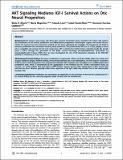Por favor, use este identificador para citar o enlazar a este item:
http://hdl.handle.net/10261/76249COMPARTIR / EXPORTAR:
 SHARE SHARE
 CORE
BASE CORE
BASE
|
|
| Visualizar otros formatos: MARC | Dublin Core | RDF | ORE | MODS | METS | DIDL | DATACITE | |

| Título: | AKT signaling mediates IGF-I survival actions on otic neural progenitors |
Autor: | Rodríguez Aburto, María CSIC ORCID; Magariños, Marta CSIC; León, Yolanda CSIC ORCID; Varela-Nieto, Isabel CSIC ORCID ; Sánchez-Calderón, Hortensia CSIC | Fecha de publicación: | 2012 | Editor: | Public Library of Science | Citación: | PLoS ONE 7(1): e30790 (2012) | Resumen: | [Backgroun]: Otic neurons and sensory cells derive from common progenitors whose transition into mature cells requires the coordination of cell survival, proliferation and differentiation programmes. Neurotrophic support and survival of post-mitotic otic neurons have been intensively studied, but the bases underlying the regulation of programmed cell death in immature proliferative otic neuroblasts remains poorly understood. The protein kinase AKT acts as a node, playing a critical role in controlling cell survival and cell cycle progression. AKT is activated by trophic factors, including insulin-like growth factor I (IGF-I), through the generation of the lipidic second messenger phosphatidylinositol 3-phosphate by phosphatidylinositol 3-kinase (PI3K). Here we have investigated the role of IGF-dependent activation of the PI3K-AKT pathway in maintenance of otic neuroblasts. [MMethodology/Principal Findings]: By using a combination of organotypic cultures of chicken (Gallus gallus) otic vesicles and acoustic-vestibular ganglia, Western blotting, immunohistochemistry and in situ hybridization, we show that IGF-I-activation of AKT protects neural progenitors from programmed cell death. IGF-I maintains otic neuroblasts in an undifferentiated and proliferative state, which is characterised by the upregulation of the forkhead box M1 (FoxM1) transcription factor. By contrast, our results indicate that post-mitotic p27(Kip)-positive neurons become IGF-I independent as they extend their neuronal processes. Neurons gradually reduce their expression of the Igf1r, while they increase that of the neurotrophin receptor, TrkC. [Conclusions/Significance]: Proliferative otic neuroblasts are dependent on the activation of the PI3K-AKT pathway by IGF-I for survival during the otic neuronal progenitor phase of early inner ear development. | Versión del editor: | http://dx.doi.org/10.1371/journal.pone.0030790 | URI: | http://hdl.handle.net/10261/76249 | DOI: | 10.1371/journal.pone.0030790 | Identificadores: | doi: 10.1371/journal.pone.0030790 issn: 1932-6203 |
| Aparece en las colecciones: | (IIBM) Artículos |
Ficheros en este ítem:
| Fichero | Descripción | Tamaño | Formato | |
|---|---|---|---|---|
| AKT.pdf | 4,6 MB | Adobe PDF |  Visualizar/Abrir |
CORE Recommender
PubMed Central
Citations
28
checked on 22-abr-2024
SCOPUSTM
Citations
51
checked on 23-abr-2024
WEB OF SCIENCETM
Citations
52
checked on 25-feb-2024
Page view(s)
364
checked on 23-abr-2024
Download(s)
273
checked on 23-abr-2024
Google ScholarTM
Check
Altmetric
Altmetric
Artículos relacionados:
NOTA: Los ítems de Digital.CSIC están protegidos por copyright, con todos los derechos reservados, a menos que se indique lo contrario.
